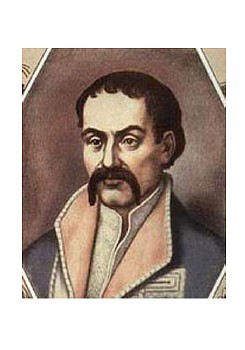|
- - - -
Pylyp Orlyk
Orlyk Pylyp Stepanovich
(11.10.1672 – 24.05.1742)
Statesman, politician, thinker, poet, publicist; the author of the first Constitution of Ukraine
Pylyp Orlyk was born in the village of Kosuta, Vileyka district of the region of Minsk. He studied at the Jesuit college in Wilno (now Vilnius, Lithuania), was graduated from Kyiv-Mohyla Academy in 1694. In 1698, he was appointed scribe in the Metropolitanate of Kiev. In 1700, Orlyk became a senior clerk of General Military Chancellery. Since 1706, he was a senior scribe of chancellor of Zaporizhian Host. When in 1710 Hetman Ivan Mazepa died, Orlyk was elected as a Hetman of Right-bank Ukraine. In 1711, he was the leader of 16,000-strong army which in cooperation with Polish troops and Crimean Tatars made an unsuccessful attempt to liberate Ukraine. Since 1712, he lived as an emigrant in Sweden, Turkey, Germany and France. Pylyp Orlyk died in Jassy (Rumania).
Orlyk is the author of such works like “Russian Alkid” (1695), “Gippomen Sarmatcki” (1698), “Diariush podrohzny” (1720–1733), «Code of Ukrainian laws” and “The manifesto to European governments” (1712). His main work “Pacts and Constitutions of Rights and Freedoms of the Zaporizhian Host” (1710) went down in history as the first Constitution of Ukraine. It is based on the idea of natural rights and agreed origin of the state. People act as a subject of their rights and obligations, and for the common good they conclude a treaty and transfer to political elite some of their rights and freedoms in order to provide public tranquility and external security. In his Constitution, Orlyk tended to the limitation of the authority of the Hetman by a constant participation in the governance of the general foreman and the General Council. The author prefer constitutional principles to the principles of despotic constrain and idea of the absolute power of the government, which prevailed in the Europe of those days.
Works:
1. Вивід прав України. Львів, 1991.
Literature:
1. Kpyпницький Б. Д. Гетьман Пилип Орлик (1672 — 1742). Його життя і доля. Киев, 1991.
2. Різниченко В. Пилип Орлик (Гетьман-Емігрант). Його життя і діяльність. Киев, 1991.
3. Слюсаренко А. Г., Томенко М. В. Історія української конституції. Киев, 1995.

© National Academy of Sciences of Belarus, 2011
|
|


